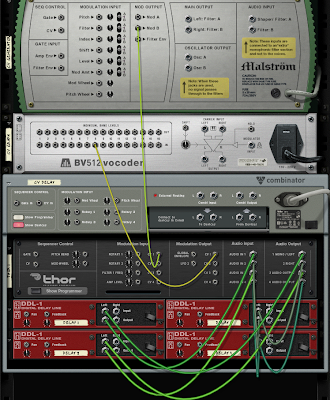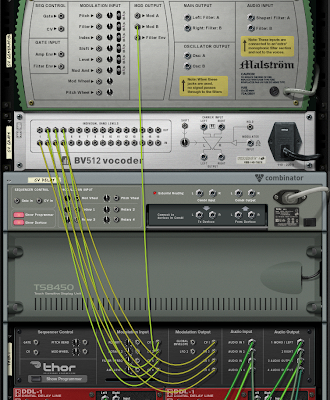Quick Tip: CV Delay
A "CV Delay" is quite easy to do once you have a way to convert CV to Audio and Audio to CV (you can use the CV2Audio2CV for that).
A simple way to achieve this with up to 4 independent CV signals, is to use Thor's Audio outputs connected to 4 DDL-1's and back again through Thor's Audio inputs:
So, to test all 4 CV delayed signals, I'll use BV512's CV inputs to graphically show what's going on:
Now, let's check the front and see if the CV Delay is working...
...and there you have it, a working 4x CV Delay:)
Next post I'll talk about some of the devices and the way I usually use them for CV display (more like CV debugging, really). I'll talk about the use of the DDL-1, MClass Equalizer, RV7000, BV512, Thor and PEQ-2 as possible CV debugging tools.
After that, the obvious way to do a rudimentary CV Scope using a stack of 4 CV Delay units :) ...as you can guess from the above pictures, it's something quite simple to achieve, once you understand what you want and what's going on ;)
A simple way to achieve this with up to 4 independent CV signals, is to use Thor's Audio outputs connected to 4 DDL-1's and back again through Thor's Audio inputs:
So, to test all 4 CV delayed signals, I'll use BV512's CV inputs to graphically show what's going on:
Now, let's check the front and see if the CV Delay is working...
...and there you have it, a working 4x CV Delay:)
Next post I'll talk about some of the devices and the way I usually use them for CV display (more like CV debugging, really). I'll talk about the use of the DDL-1, MClass Equalizer, RV7000, BV512, Thor and PEQ-2 as possible CV debugging tools.
After that, the obvious way to do a rudimentary CV Scope using a stack of 4 CV Delay units :) ...as you can guess from the above pictures, it's something quite simple to achieve, once you understand what you want and what's going on ;)
 (click to zoom)
(click to zoom) (click to zoom)
(click to zoom) (click to zoom)
(click to zoom)

Comments
Post a Comment